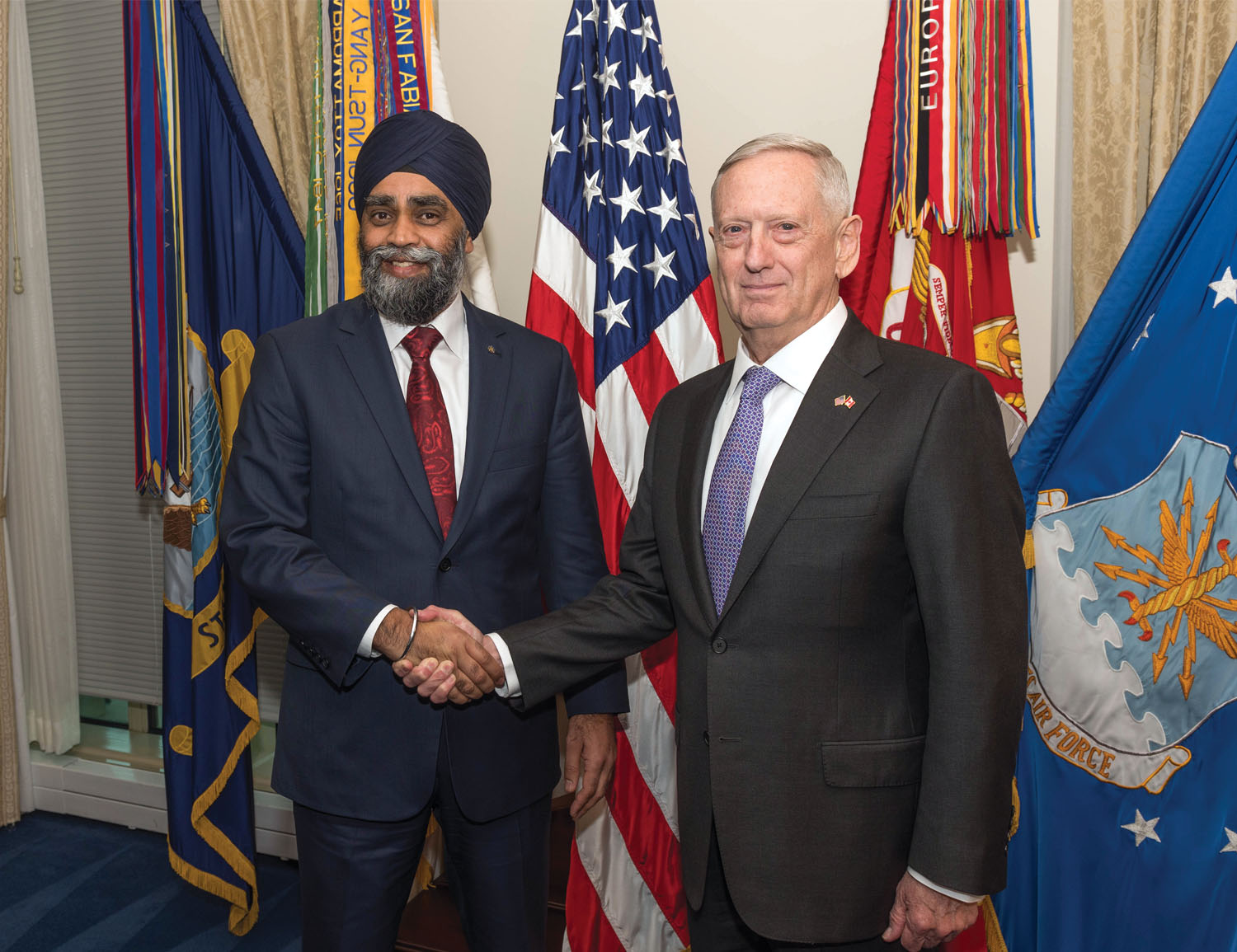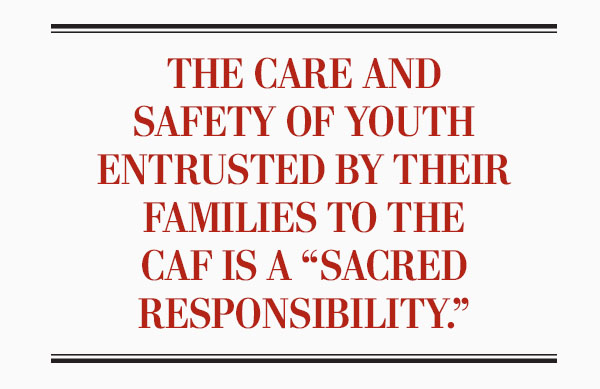
Minister of National Defence Harjit Sajjan shakes hands with United States Defense Secretary James Mattis at the Pentagon on Feb. 6. [M.Cpl. Jennifer Kusche, Canadian Forces Combat Camera]
Ask veteran soldiers their feelings about peacekeeping missions and chances are you’ll get a negative response. Acting as referee and policeman in areas of hostility is like doing the job with one hand tied behind your back, they’ll say.
Strict rules of engagement—preventing peacekeepers from firing unless fired upon, for example—endangered blue-helmeted troops and limited their effectiveness.
Minister of National Defence Harjit Sajjan, a decorated military veteran who was wounded on duty in Bosnia and did three tours in Afghanistan, doesn’t dispute the impressions of his former colleagues.
“You’ve got to look at how peacekeeping started,” he said in a wide-ranging interview with Legion Magazine. “It was designed for a particular set of security challenges where peace agreements were signed by both parties and you have this intervening force coming in between to enforce that peace.
“Over time, as conflicts changed, they weren’t evaluated as thoroughly as they could have been, which created [new] challenges. The right rules of engagement weren’t there; the chain of command function in terms of authority was not there.”
Last year, the federal government announced it would commit up to 600 troops to UN peace-support operations, but a decision was delayed following the election of Donald Trump to the White House.
Trump’s ambassador to the United Nations, Nikki Haley, has made peacekeeping reform a top priority. The Americans spend nearly US$8 billion annually on peacekeeping missions and Haley has said she wants to look at all 16 U.S. missions to see which are succeeding in maintaining peace and which aren’t.
Trump has said Washington spends far too much on other countries’ security. Sajjan, meanwhile, held his first face-to-face with his U.S. counterpart, retired marine general James Mattis, on Feb. 6.
The minister and the secretary of defence discussed continental defence as well as multilateral issues, including pledges to lead NATO battle groups in Eastern Europe and conduct UN operations.
But the question of where and when those UN commitments would be fulfilled remained unanswered immediately following the discussion. Canada was considering sending troops to Mali.
Wherever it ends up, rest assured the mission will be conducted differently than many of its predecessors. Gone in many cases are the days of two sides, a line and the formalities of diplomacy.
The factors involved are ever more complex and it’s not fair to the troops to send them into situations that haven’t been thoroughly assessed, said Sajjan.
Times have indeed changed, he said, and there is no one-size-fits-all solution to peacekeeping challenges. Canada’s diversity and world view are ideally suited to the demands of modern-day peace-support operations, he argued.
“It’s about understanding the conflict first,” he said. “When you understand the conflict, then you create the mechanism required to accomplish your objectives. When you look at the reality of today, it is not the peacekeeping of the past.”
Robust rules of engagement, yes, but also flexibility for commanders on the ground and the ability to make quick decisions for the safety and security of civilians.
Canada’s innovative approach to peacekeeping is not limited to military options either, he added. Several government departments are involved and assessments are based on where Canadians can make the most impact with finite resources.
In Africa, for example, poverty and a preponderance of vulnerable youth who don’t see hopeful futures are major factors in the recruitment and development of extremists. “If we don’t give them a future, they’re going to find some other things to do and, regrettably, they’re going to be sucked into the extremist propaganda.”
The military gets most of the attention but it actually plays a supporting role in many peace-support operations, said Sajjan. “We want to bring innovative solutions that are going to move the yardstick forward and help improve the efficiency and solve some of the problems that have marred the United Nations in the past.”

Sajjan also dispelled any suggestion the survival of the North Atlantic Treaty Organization was in question.
“I’m confident that the importance of NATO involves all of the member states,” Sajjan said. “I think the focus of the discussion will be: how do we make NATO even better? That’s something that we’ve always been striving for.”
After his inauguration, Trump told the German daily Bild and The London Times that the 28-member alliance is “obsolete” and unfair to the United States.
Only five NATO members met the group’s defence-spending standard of two per cent of GDP last year—Greece, Estonia, Poland, the U.K. and the U.S. Canada’s spending increased slightly in 2016, to 1.02 per cent of GDP from 0.98.
That moved Canada to 20th from 23rd in military spending as a percentage of GDP among NATO’s 28 allies. It’s in a three-way tie with Hungary and Slovenia. Only Belgium, the Czech Republic, Iceland, Luxembourg and Spain spent less. Canada currently spends about $20 billion annually on defence.
Sajjan confirmed Canada would increase its military spending following a defence review, but he added that alone is not a reliable indicator of the contributions members make to the organization. Canada, he said, is NATO’s sixth largest financial contributor and hits well above its weight in terms of participation.
“It’s kind of an overall, general metric that if you spend money on defence, you’re going to be doing more,” the minister said. “At the end of the day, you can spend all the money you want on your military, if your output is not there for supporting NATO roles well, guess what, you’re really not providing any legitimate support.”
Among other contributions, Canada is leading a NATO mission in Latvia, where it has committed 450 troops along with light-armoured vehicles and other military equipment as part of an effort to deter Russian aggression in Eastern Europe.
“We believe in multilateralism,” said Sajjan. “We were one of the co-founders of NATO and we will be playing a significant role.
“NATO plays a critical role in the wider peace and security, not just for Europe but in the rest of the world, from capacity-building to deterrence.”
Mattis, who served as NATO’s supreme allied commander for transformation, phoned NATO Secretary General Jens Stoltenberg after talking to Sajjan and reinforced “the key role NATO plays in transatlantic security,” said the Pentagon. Sajjan said future Canadian defence spending will be “directly linked to the output that we’re doing.”
“This will not be a laundry list of equipment. This will be an actual, real defence policy based on capabilities that allow us to then figure out what do we need—the size, the structure and the new capabilities that we need to get.”
Advertisement


















